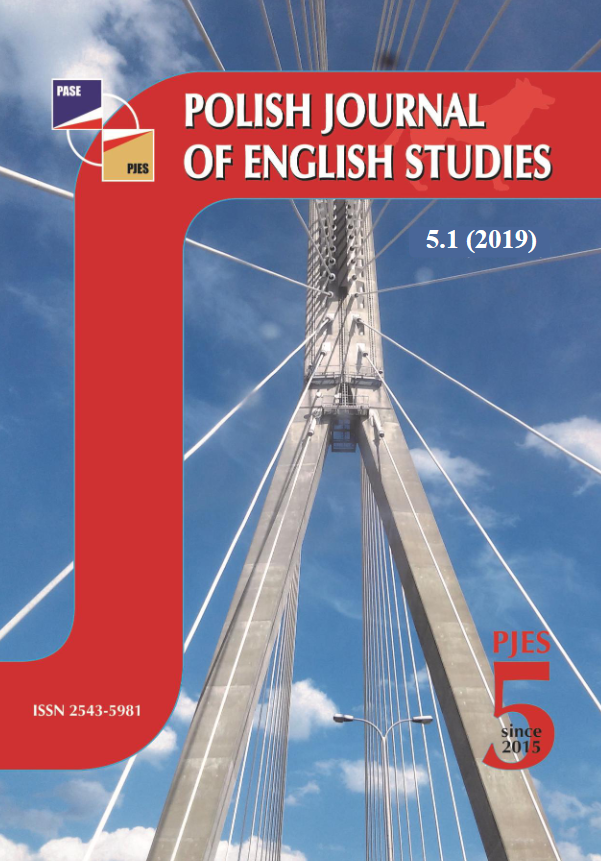Numer 5.1 (2019)
|
Spis treści
Strony
Pobierz
|
|||||
|
|
|||||
|
INFORMACJE O AUTORACH Jacek Fabiszak Uniwersytet im. Adama Mickiewicza w Poznaniu Krzysztof Fordoński Uniwersytet Warszawski |
|||||
|
|
|||||
|
Słowa kluczowe J.G. BallardStreszczenie The confluence of spatiality and identity has been one of the central issues in psychogeographical research. J.G. Ballard’s fiction offers a valuable entry point into such considerations, especially when viewed alongside theoretical developments in the field of spatiality studies. In approaching the topic of identity disintegration in Ballard’s High-Rise and Concrete Island, this article attempts to present the complicit role the environment plays in self-determination. Though psychoanalysis has traditionally served as the first-line approach to Ballard’s work, spatiality studies offers an invaluable theoretical context, in which to further flesh out relationship that exists between the alienation, violence and isolation experienced by the characters and the particular environment they find themselves occupying. INFORMACJE O AUTORZE
Uniwersytet Wrocławski
|
|||||
|
|
|||||
|
Słowa kluczowe laughter |existential |alienation |body |freedomStreszczenie The present paper traces the motif of laughter in the novels of Marylin Duckworth, a prominent contemporary New Zealand writer, in terms of its existential import. The first part provides an overview of the most significant existentialist and existentially-tinged perspectives on laughter, while the second one employs some of them to bring to light the underlying meaning and function of the recurrent outbursts of laughter in Duckworth’s fiction. It is demonstrated that they usually accompany the heroines in the moments of existential crises, generated by the experience of alienation and self-alienation, when their most cherished notions of external reality and themselves fall into disarray. As such, laughter becomes a harbinger of enhanced self-awareness and insight into the truth of existence. Most importantly, it also betrays anxiety arising at the prospect of unrestricted freedom and concomitant responsibility for shaping one’s own life. Finally, it may serve also as a tool of interpersonal communication: either a weapon through which one may assert superiority over the other person or, quite the contrary, a facilitator of reciprocal recognition that binds people together. INFORMACJE O AUTORZE
Uniwersytet Warszawski
|
|||||
|
|
|||||
|
Słowa kluczowe Goldsmiths Prize |literary prizes |experimental literature |avant-garde |contemporary British fictionStreszczenie In the aftermath of a critical debate regarding the Man Booker Prize’s adoption of ‘readability’ as the main criterion of literary value, Goldsmiths College established a new literary prize. The Goldsmiths Prize was launched in 2013 as a celebration of ‘fiction that breaks the mould or extends the possibilities of the novel form.’ Throughout its six editions, the prize has been awarded to such writers as Ali Smith, Nicola Barker and Eimear McBride, and has attracted a lot of media attention. Annually, its jury have written press features praising the shortlisted books, while invited novelists have given lectures on the condition of the novel. Thanks to its quickly won popularity, the Goldsmiths Prize has become the main institution promoting – and conceptualizing – ‘experimental’ fiction in Britain. This article aims to examine all the promotional material accompanying each edition – including jury statements, press releases and commissioned articles in the New Statesman – in order to analyze how the prize defines experimentalism. INFORMACJE O AUTORZE
Uniwersytet Wrocławski
|
|||||
|
|
|||||
|
Słowa kluczowe translation |screenplay |specialized translation |literary translation |text-typeStreszczenie Screenplay is the script of a film, including acting instructions and scene directions. There is a long way from finished screenplay to the moment when the film is distributed and the audience can watch it on the screen in the cinema. If the film is a co-production engaging foreign actors and foreign financing, one of the stages in the process is translation of the screenplay from native to another language, for instance English. Screenplay itself is a literary text, but its final product is a film. Screenplay has a specific formatting style, and it is written according to set guidelines. It combines specialized text and literary text. Screenplay is both a work of art, inspiring all the people engaged in the process of film production, and a technical blueprint for the future movie. This article describes the task of the translation of a screenplay for production and shooting purposes, discusses the elements that must be taken into account while translating it, and focuses on possible issues connected to translation of this type of modular text. INFORMACJE O AUTORZE
Karkonoska Państwowa Szkoła Wyższa w Jeleniej Górze
|
|||||
|
The 28th PASE conference Diversity is inclusive. Cultural, literary and linguistic mosaic 27-28 June 2019
75 – 76
|
|||||
|
|
|||||

